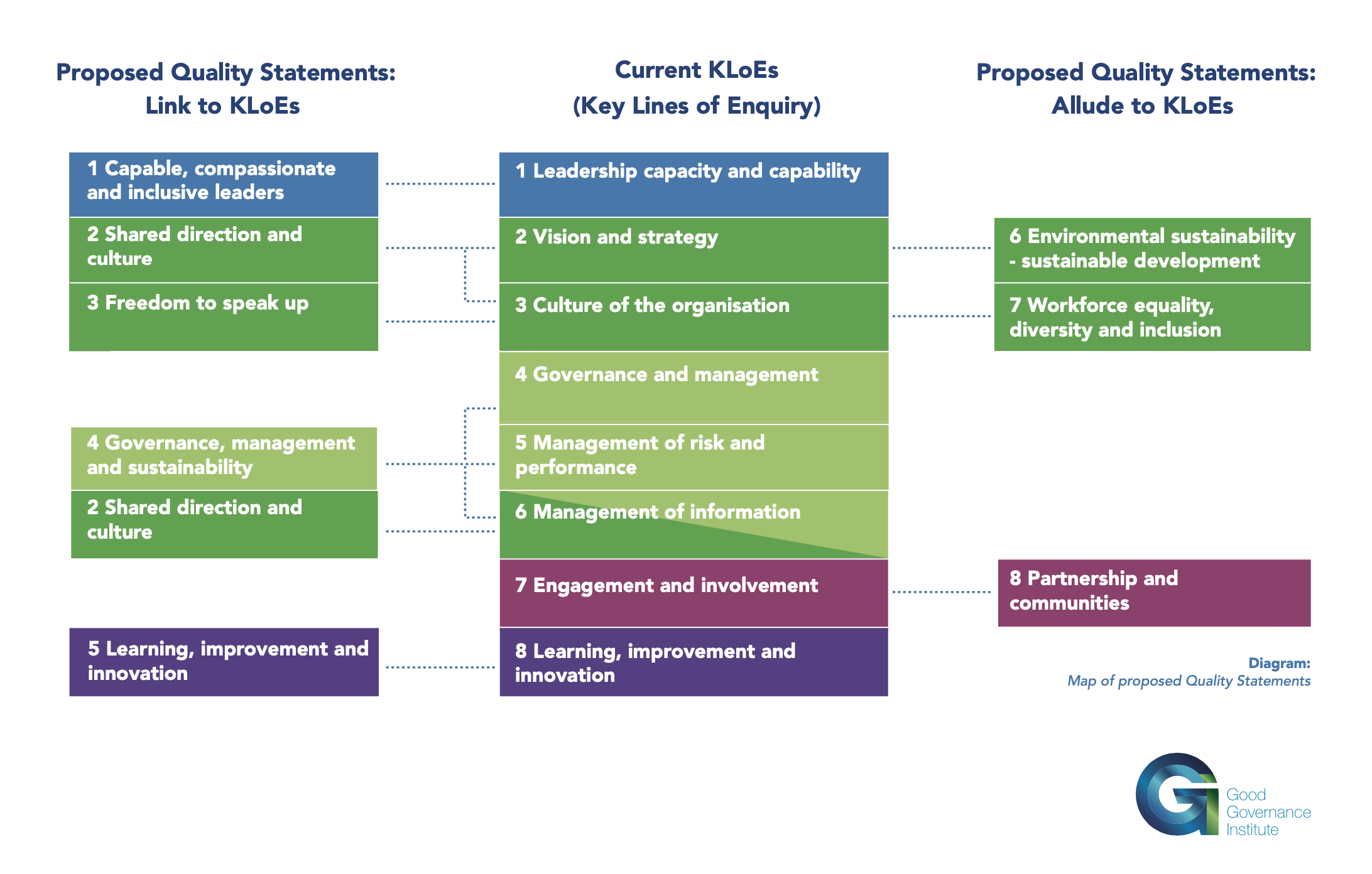Preparing for the new CQC framework
30 September 2022
Are you ready for the CQC’s new single assessment framework? GGI senior consultant Joanna Watson says there are some immediate steps to take.
(This follows last week's blog by David Holden, which set the scene for the CQC changes)
Last week, we set the scene for the fast-approaching switch to the Care Quality Commission’s new single assessment framework, arguing that NHS organisations should be preparing now for the introduction of the new framework in January.
The new framework will result in a greater focus on workforce equality diversity and inclusion, on partnership working, and on environmental sustainability. As we said in our previous article, these had been clearly signalled in the draft code of governance for NHS provider trusts, published in May.
And, as we also said last week, the new focus areas reflect some of the biggest issues facing the health service:
- The greater expectation of collaboration associated with integrated care systems.
- The workforce crisis facing the NHS, particularly around recruitment and retention.
- The increasingly significant emphasis across the NHS on sustainability.
This week we explore the new framework in a little more detail and ask what NHS organisations can do to prepare for the go-live date in just two months.
What has changed – and what to do about it
Under its new single assessment framework, the CQC will continue to use five key questions (safe, effective, caring, responsive and well-led) to assess providers. And it will continue to rate them on its current four-point scale (outstanding, good, requires improvement and inadequate).
Beneath each question is a set of topic areas and quality “we” statements, which replace the current eight key lines of enquiry (KLoEs). As you can see in this diagram, the new statements broadly map to the old KLoEs, although framing them as statements rather than inspection categories feels like a shift of emphasis, encouraging organisations to take ownership of the areas covered rather than them being things that are done to them by the CQC.

The CQC has also set out six evidence categories, covering the way evidence is gathered to support the quality statements:
- people’s experience
- feedback from partners
- feedback from staff
- observation of processes
- observation of care
- outcomes of care
These categories show the range of information the CQC will use to assess providers flexibly. We can expect this to be undertaken more frequently and not be tied to set dates or driven by previous ratings. Evidence will be collected on an ongoing basis and an organisation’s ratings can be changed at any time.
The CQC is already working with a range of early adopter organisations and is refining its new online provider portal, which, it says, is designed to help ‘collect data in a structured format that will make it easier and quicker to analyse’. This portal is due to open up to all providers this month (October).
Until January, the way the CQC undertakes its core activity will be unchanged for all except the early adopter providers. At that point, the rollout will begin of the new way of regulating. That means all providers will be regulated against the new framework, will use the new portal, and will have relationships with the CQC team in their area.
Making sure those relationships are strong and two-way is one step providers can take immediately. Another is to ensure you are familiar with the new categories of evidence and that you are compiling examples of how your organisation meets the expectations set out in the statements.
This increased focus on data and evidence, along with the shift away from major inspections on fixed dates towards more flexible arrangements, means it makes sense to conduct a thorough review of the data you collect to make sure it matches the “we” statements and supports what they contend. You also need to make sure that this is not just a once off exercise and you have measures in place to keep it up to date.
Well-led specifics
Another evolving area is around independent developmental well-led reviews, which providers are encouraged to commission every three years, based on NHS England’s framework, jointly developed with the CQC in 2017.
NHS England guidance says: “In-depth, regular and externally facilitated developmental reviews of leadership and governance are good practice across all industries. Rather than assessing current performance, these reviews should identify the areas of leadership and governance of organisations that would benefit from further targeted development work to secure and sustain future performance.”
This framework is also due to be updated – in fact, a new version was promised during the summer of this year but there has been no sign of it yet. Until it arrives, providers should continue to use the existing framework, doing what they can to take into account the different emphasis of the new quality statements.
How GGI can help
GGI is closely monitoring the changing assessment picture. Our work continues to be based on the existing assessment criteria, but also takes fully into account the new framework and the draft code of governance. Our advice will help you to meet existing requirements as well as prepare for the changes coming in January.
Well-led review – GGI will work with you through a developmental review of your leadership and governance, using NHSE’s well-led framework, helping you to deliver high-quality, compassionate healthcare.
Rapid assessment – GGI is here to help you prepare for regulator inspections. For NHS Trust and ICS boards our rapid CQC preparation offer can be carried out much more quickly than you might think.
Workshops – We run board workshops or briefing sessions to help your organisation adjust to a changing regulatory landscape.
If you’d like to find out more about any of these services, or you’d just like to discuss the impending changes, you can contact us here.
